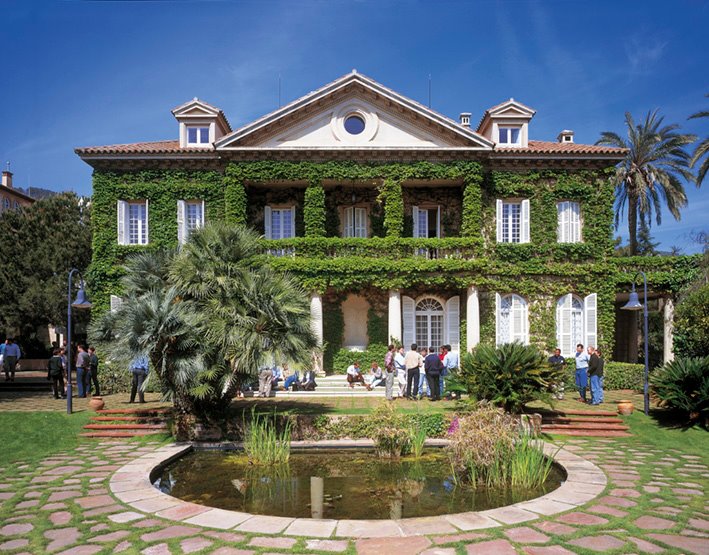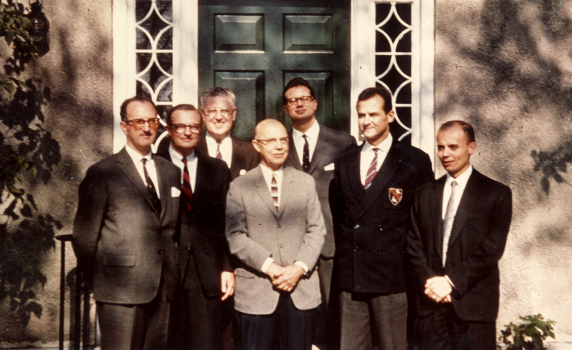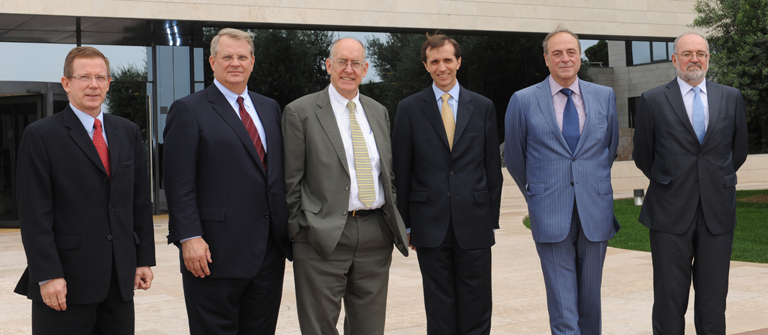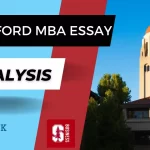Five Decades of Europe’s First Two-Year MBA Program

IESE’s Barcelona Campus
Home of the Full-Time MBA Program
IESE Business School, Instituto de Estudios Superiores de la Empresa, was founded in 1958 in Spain to provide a holistic view on the ethical and human aspects of business activities. IESE is the graduate business school of the University of Navarra.
Antonio Valero, IESE’s first Dean, learned about Harvard Business School’s case study method in 1958 and over the course of the following five years, worked on establishing the Harvard-IESE Committee that culminated in the formation of IESE’s MBA program.
The Harvard-IESE Committee
“In February 1963, during a trip to Rome with professors Félix Huerta and Antonio Valero, we settled on an idea that we had been hatching for some time,” says Prof. Carlos Cavellé.
Huerta, Juan Farrán, Esteban Masifern and Cavellé, all professors at IESE in Spain, had attended the International Teachers’ Program earlier that year at Harvard and were inspired to establish the Harvard-IESE Committee – a council that brought together two schools separated by 6,000 km.
In May 1963, Harvard Professor Franklyn E. Folts wrote to Valero saying, “You will be pleased to know that at the meetings of the HBS Committee on International Activities and the HBS Faculty over the past two days, the proposal of having Harvard people on your MBA Advisory Committee was approved. You will be told this officially by Dean Baker soon. Also the idea of eventual exchange professorships was accepted.”
Birth of Europe’s First Two-Year MBA Program

Harvard-IESE Committee in 1963,
Huerta, Hansen, Hower, Folts, Cavallé and Faus
The same year, on October 9, the Harvard-IESE Committee met for the first time in Boston. What became of this historic moment? The creation of the first two-year MBA program on the European side of the Atlantic.
The exchange of professors and students across universities was commonplace but a common council – that was a novel idea. Over time, the council served as a forum for IESE and Harvard to share ideas, problems and experiences and offer new perspectives. A review of the topics discussed in the committee is like taking a journey through the last 50 years of the evolution of business schools. Harvard professor Richard H. K. Vietor said “working together helps to strengthen both research and teaching.” The committee is said to have facilitated improvement in both these fields at Harvard and IESE.
Expansion Through Alliances
Over the past five decades, IESE has forged numerous alliances helping in the formation of 15 associated business schools in 4 continents. Its exchange program boasts names such as Berkeley-Haas, Chicago Booth, Columbia, Kellogg, Wharton and Yale.
IESE’s Advisory Board and Executive Committee of the IESE Alumni Association offer advice on educational programs, expansion, investment and corporate involvement. Their counter-part in the US monitor activities in the United States especially New York. The global community has its campuses and facilities in Barcelona, Madrid, Sao Paulo, Munich and New York.
IESE’s foreign alliances have led to the creation of a world-class course, prepared to address the needs of contemporary business world.
Harvard-IESE Committee Today

50th Anniversary
Harvard-IESE Committee
The 51st annual meet of the Harvard-IESE alliance was held on 23 May 2014 in Boston – the same city that hosted the committee’s first meeting back in 1963. This year’s agenda included:
- Faculty development
- Impact of new methodologies
- Joint programs
The faculty from HBS included Srikant M. Datar, W. Carl Kester and Richard H. K. Vietor. Dean Jodi Canals, Professors Jose L. Nueno, Joan E. Ricart and Eric Weber represented IESE.
To celebrate the culmination of 50 years of collaboration, http://blog.iese.edu/hbs-iese/ was launched with all the information regarding the committee’s formation, teaching methods also providing users with exclusive content on the future of management education. Apart from analyzing key business and education trends and producing outstanding leadership, the committee continues to invest in joint programs such as the “Global CEO Program for China”.
This transcontinental effort could indeed alter the future of business education.






